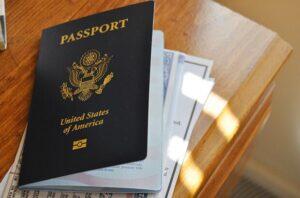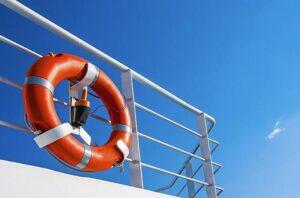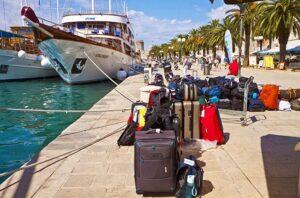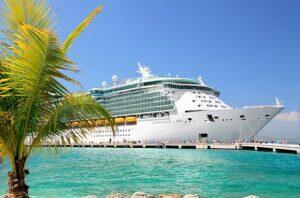Staying Healthy on Your Cruise

Accidents can happen to even the most careful people...
Contents
And an unexpected illness can strike at any time. That’s why almost every ship has a medical center staffed by a physician, though it’s best to educate yourself on ways to avoid common onboard ailments so you never have to go there.
Contents
INSIDER TIPOutbreaks of serious illness on cruise ships are exceedingly rare, but they do happen.
The Medical Center
All travelers should carry a small first-aid kit with adequate supplies for minor scrapes and ailments. For any health issues that fall beyond that, the ship’s doctor should be able to treat you (as can any general practitioner or clinic ashore). If you’re examined by the ship’s doctor, you’ll be charged for your office visit (a regular visit can be around $90, but more extensive treatments can be several hundred dollars). Any medicines prescribed are extra, and the ship’s pharmacy will be limited in scope. A notable exception is if you’re injured in some manner aboard the ship or during a cruise-sponsored shore excursion, in which case your treatment should be free. But ships are not really equipped for complex health emergencies, which may require evacuation by boat or helicopter, for which you will be charged.
-
- A visit to the ship’s doctor isn’t free.
- Be sure your travel insurance covers medical evacuation from the ship.
- Most U.S. health insurance plans do not cover treatment on board cruise ships or sometimes any treatment outside the United States.
Common Ailments
Several ailments are more common among cruise passengers. This is one reason you may be asked to fill out a health questionnaire as you board your ship. You will be asked to verify that you do not have any serious medical symptoms like fever or nausea and are not aware of having been exposed to any communicable diseases. It’s best to answer these questions honestly.
Seasickness
The most common ailment to trouble cruise passengers is seasickness. Modern vessels are equipped with stabilizers that eliminate much of the motion responsible for seasickness, but that doesn’t necessarily mean that you won’t get seasick on a large cruise ship. You need not suffer, however, as several treatments are available. The most common drugs are Dramamine and Bonine; these are over-the-counter antihistamines that are available at most pharmacies.
If you want to avoid medication, you may wish to explore a few homeopathic and natural remedies for seasickness, like consuming bitters, ginger, or stomach-settling foods like crackers and apples. Taking in fresh air (and keeping an eye on the horizon), simply lying down, and acupressure wristbands (called Sea-Band) can help alleviate symptoms, too.
Influenza
When you’re traveling, the risk for exposure to influenza depends on the time of year and destination. Influenza might be, at best, an inconvenience; however, it can lead to complications, including life-threatening pneumonia. An annual influenza vaccination is the primary method for preventing influenza.
Noroviruses
Noroviruses are a group of related viruses that cause acute gastroenteritis in humans. Highly contagious noroviruses are transmitted primarily through the fecal-oral route, either by consumption of contaminated food or water, or by direct person-to-person contact. Symptoms of norovirus infection include vomiting, diarrhea with abdominal cramps, and nausea. Low-grade fever occasionally occurs, too. Dehydration is the most common complication, especially among the young and elderly, and may require medical attention. Symptoms generally last 24 to 60 hours and recovery is usually complete (there’s no evidence of any serious long-term effect). Cruise lines that sail to and from the United States must report all instances of norovirus to the Centers for Disease Control and Prevention. Proper hand-washing is the best way to prevent norovirus.
Avoiding Illness
No one wants to get sick during a highly anticipated vacation, but there are ways you can minimize your chances of getting sick. The best way to prevent all illness is to wash your hands thoroughly and often, especially after using the restroom and before eating and drinking. When water is not available, use a hand sanitizer. On most cruise ships, hand sanitizer is provided near all entry points and at all dining venues. Some passengers even bring antiseptic wipes to treat the surfaces of their rooms. If you do become ill, it’s always best to observe any recommended quarantine procedures so that you do not infect other passengers.
What to Bring
If you pack a basic travel first-aid kit, you’ll be prepared for minor emergencies and may not have to call on the ship’s medical staff for every minor incident.
A Travel First-Aid Kit
-
- adhesive bandages
- waterless antibacterial hand sanitizer
- antinausea medication
- antacid tablets
- seasickness remedy
- prescription medications (keep in original containers)
- compression stockings (for long flights)
- first-aid antibacterial cream
- aspirin or nonaspirin pain reliever
- antidiarrheal medication
- antihistamine
- zipper-top plastic bags or ice bag
- dental adhesive or a dental repair kit (if you wear dentures)























